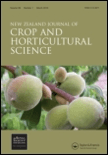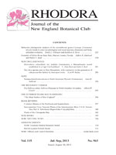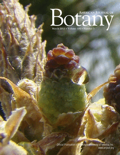
BANGLADESH JOURNAL OF BOTANY
Scope & Guideline
Advancing Botanical Knowledge in Bangladesh
Introduction
Aims and Scopes
- Plant Genetics and Breeding:
Research focused on the genetic diversity, molecular characterization, and breeding of various plant species, particularly staple crops such as rice and maize, to enhance yield and resilience against environmental stresses. - Plant Physiology and Biochemistry:
Studies investigating the physiological and biochemical responses of plants to various abiotic stresses such as drought, salinity, and heavy metals, as well as the role of plant growth regulators in enhancing plant growth and productivity. - Medicinal Plants and Phytochemistry:
Exploration of the phytochemical properties and potential medicinal applications of various plant species, including the assessment of biological activities such as antioxidant, antibacterial, and antifungal effects. - Environmental Botany and Ecology:
Research pertaining to the ecological aspects of plant communities, including biodiversity assessments, the impact of environmental factors on plant growth, and studies on soil health and plant-microbe interactions. - Agricultural Practices and Crop Management:
Focus on sustainable agricultural practices, including the effects of different fertilization methods, irrigation regimes, and crop rotation on plant growth and yield, as well as the use of biological control agents.
Trending and Emerging
- Climate Resilience and Adaptation in Crops:
An increasing number of studies are focused on developing climate-resilient crop varieties that can withstand environmental stresses, highlighting the importance of research on abiotic stress tolerance. - Sustainable Agricultural Practices:
Research emphasizing sustainable farming techniques, including organic farming, integrated pest management, and the use of biofertilizers, is on the rise, reflecting a global trend towards more environmentally friendly agricultural practices. - Molecular Characterization and Genomic Studies:
There is a growing trend in utilizing molecular techniques for the characterization of plant species and understanding genetic variations, which is crucial for breeding programs aimed at improving crop performance. - Ecological Restoration and Conservation Biology:
Emerging themes in the journal include studies on ecological restoration practices and conservation strategies for endangered plant species, which are critical in the face of habitat loss and climate change. - Utilization of Indigenous Plants and Ethnobotany:
An increase in research focusing on the ethnobotanical aspects and the potential uses of indigenous plants for food, medicine, and sustainable practices indicates a rising interest in traditional knowledge and biodiversity.
Declining or Waning
- Traditional Agricultural Practices:
Research related to conventional agricultural methods is becoming less frequent as there is a notable shift towards sustainable and innovative agricultural practices that promote ecological balance and resource conservation. - Invasive Species Management:
Studies focusing specifically on the management of invasive plant species in Bangladesh have decreased, possibly due to a growing emphasis on biodiversity conservation and native species restoration. - Purely Taxonomic Studies:
While taxonomic research remains important, there appears to be a decline in purely descriptive taxonomy studies without applied ecological or conservation implications, as more emphasis is placed on functional and ecological research.
Similar Journals

Plant Science Today
Advancing plant knowledge for a sustainable tomorrow.Plant Science Today is a prominent journal dedicated to advancing the field of plant sciences through innovative research and comprehensive reviews. Published by HORIZON E-PUBLISHING GROUP in India, this open-access journal has been actively disseminating knowledge since its inception in 2018, with a convergence period extending to 2024. With an ISSN of 2348-1900 and a growing reputation, it is categorized in various quartiles for 2023, notably achieving Q3 in Biochemistry, Genetics and Molecular Biology (miscellaneous), while it holds Q4 rankings in critical fields including Ecology and Plant Science. As a valuable resource for students, researchers, and professionals, Plant Science Today aims to inspire discussion and innovation in the realm of ecological and plant science disciplines, where it currently ranks within the lower percentiles in prominent categories such as Environmental Science and Agricultural and Biological Sciences. The journal serves as a crucial platform for the exploration of experimental and theoretical advances, fostering a community eager to explore plant biology's complexities.

Egyptian Journal of Botany
Empowering researchers to shape the future of botany.Egyptian Journal of Botany is a premier publication in the field of botanical sciences, encompassing agricultural research, plant biology, and ecology. Published by the NATL INFORMATION DOCUMENTATION CENT, ACAD SCIENTIFIC RESEARCH & TECHNOLOGY in Egypt, this journal has made significant strides since its establishment, now recognized within several prestigious Scopus quartiles including Q3 in Agronomy and Crop Science, and Q3 in Ecology, reflecting its impact and relevance in the scientific community. With an aim to disseminate high-quality research and foster innovation in plant sciences, the journal provides a platform for researchers, professionals, and students alike to share vital findings and advancements. Although it currently operates under traditional access, the wealth of knowledge it offers is pivotal for those engaged in ecological preservation, crop improvement, and biotechnological applications. With its comprehensive scope and evolving reputation, the Egyptian Journal of Botany is poised to remain an influential player in the botanical sciences from 2019 to 2024 and beyond.

NEW ZEALAND JOURNAL OF CROP AND HORTICULTURAL SCIENCE
Empowering Researchers in Plant Sciences and BeyondThe New Zealand Journal of Crop and Horticultural Science, published by Taylor & Francis Ltd, stands as a key resource in the fields of Agronomy and Horticulture, with a commendable impact factor reflecting its quality and influence in the scientific community. Since its inception in 1989, this journal has been committed to advancing our understanding of crop development and horticultural practices, catering not only to researchers and professionals but also to students eager to delve into the intricacies of plant sciences. With a Q3 ranking in both Agronomy and Crop Science and Horticulture as of 2023, the journal occupies a significant position within the agricultural and biological sciences domain, significantly contributing to the body of knowledge in these fields. The journal features original research, reviews, and technical notes that cover a wide range of topics, ensuring a comprehensive perspective on contemporary and emerging agricultural issues. For individuals interested in accessing cutting-edge research, the journal provides subscription-based access, further enhancing its scholarly contributions.

RHODORA
Bridging Research and Practice in Plant ScienceRHODORA, published by the New England Botanical Club Inc, is a prominent journal dedicated to the field of botany, specifically focusing on Horticulture and Plant Science. With a rich history dating back to its founding years and ongoing publication from 1995 to 2024, this journal serves as a vital platform for disseminating research, reviews, and advancements in botanical studies. Though classified in the Q4 quartile for both horticulture and plant science in 2023, RHODORA remains an essential resource for researchers and practitioners, providing insights into plant ecology, conservation, and cultivation practices. While it does not offer Open Access options, the journal's commitment to quality research in a highly specialized field makes it a significant contributor to the botanical sciences, fostering collaboration and innovation among scholars and professionals in the United States and beyond.

Botany
Innovating methodologies for a greener future.Botany is a premier academic journal published by Canadian Science Publishing, dedicated to advancing the understanding of plant sciences and ecological systems. With an ISSN of 1916-2790 and an E-ISSN of 1916-2804, this journal has established itself as a respected publication in the fields of Ecology, Evolution, Behavior and Systematics, and Plant Science, reflected in its 2023 Q2 and Q3 rankings. Covering a wide range of topics, Botany is committed to fostering interdisciplinary research, promoting innovative methodologies, and disseminating significant findings from both theoretical and applied perspectives. Based in Ottawa, Canada, the journal is open access, ensuring that high-quality research is accessible to a global audience, thereby playing a crucial role in the dissemination of knowledge in the scientific community. With convergence years from 2008 to 2024, it continues to evolve alongside the scientific advancements in botanical studies, making it an essential resource for researchers, professionals, and students alike.

AMERICAN JOURNAL OF BOTANY
Illuminating the Path of Botanical DiscoveryAmerican Journal of Botany, an esteemed publication by Wiley, serves as a pivotal platform for the dissemination of groundbreaking research in the fields of botany, ecology, plant science, and genetics. With an illustrious history dating back to 1946, this journal holds a prestigious position in the academic community, evident through its Q1 ranking in both Ecology, Evolution, Behavior and Systematics and Plant Science, alongside a Q2 ranking in Genetics as of 2023. The journal maintains a competitive edge, ranked 159th in Ecology and Evolution and 124th in Plant Science according to Scopus metrics, underscoring its impact within the research landscape. Though traditionally not an open-access journal, it continues to provide valuable insights and advancements in botanical science, making it essential reading for researchers, professionals, and students dedicated to understanding and exploring the complexities of plant life. The journal's commitment to high-quality research ensures that it remains a cornerstone in the pursuit of knowledge in botany and related disciplines.

Plants-Basel
Leading the way in innovative plant research.Plants-Basel is a distinguished open access journal published by MDPI since 2012, offering a comprehensive platform for researchers and professionals in the field of ecology, plant science, and evolutionary biology. Based in Switzerland, this journal has established itself as a leader in disseminating high-quality research, evident through its impressive rankings in multiple categories, including Q1 in Ecology and Plant Science for 2023. With a substantial impact factor and a dedicated focus on advancing our understanding of plant interactions, ecosystems, and sustainable practices, Plants-Basel is vital for scholars seeking to contribute to these critical fields. The journal's commitment to open access enhances visibility and accessibility, facilitating the widespread sharing of knowledge essential for addressing contemporary ecological challenges.

Brazilian Journal of Botany
Elevating understanding of plant life and its significance.The Brazilian Journal of Botany, published by SOC BOTANICA SAO PAULO, stands as a vital resource in the field of plant sciences, particularly noted for its contributions to agricultural and biological research. With an ISSN of 0100-8404 and an E-ISSN of 1806-9959, this journal has established a robust presence since its inception, continuing to foster growth in botanical research through its anticipated publications from 2006 to 2024. Ranking in the second quartile (Q2) in Plant Science and positioned at 207 out of 516 within Scopus rankings, the journal demonstrates both quality and relevance, occupying the 59th percentile in its category. As an essential platform for scholars, practitioners, and students alike, it disseminates original research, reviews, and advancements within plant biology, thereby promoting understanding and innovation in plant sciences. While the journal currently does not offer open access, its rich content remains pivotal for those invested in the intricacies of botanical science.

Applied Biological Research
Elevating Academic Discourse in Biochemistry and GeneticsApplied Biological Research is a dynamic journal issued by the CENTRE ADVANCEMENT APPLIED SCIENCES, specializing in the interdisciplinary fields of biochemistry, genetics, and molecular biology. With its ISSN 0972-0979 and E-ISSN 0974-4517, this journal serves as a critical platform for the dissemination of peer-reviewed research that addresses pressing challenges and innovations within biological sciences. Although currently it does not adopt an Open Access model, it is dedicated to fostering academic discourse through rigorous publication practices. The journal's impact is underscored by its Scopus rankings, which place it in the 4th and 2nd percentiles in respective categories, emphasizing its emerging influence in the scientific community. Covering research from 2020 to 2024, Applied Biological Research is positioned as an essential read for researchers, professionals, and students seeking to stay at the forefront of biological research and application. Based in the beautiful region of Jammu & Kashmir, India, this journal is committed to advancing applied sciences through innovative research and outreach.

Bioagro
Connecting minds through groundbreaking agricultural science.Bioagro is an esteemed academic journal dedicated to advancing research in the field of Agricultural and Biological Sciences. Published by the University Centroccidental Lisandro Alvarado in Venezuela, this journal has made significant strides since its inception in 2008, with a focus on delivering high-quality research publications that address contemporary challenges in agriculture and biology. Recognized for its contributions, it holds a Q3 ranking in the Agricultural and Biological Sciences (miscellaneous) category as of 2023, and it ranks #125 out of 221 in its field, placing it in the 43rd percentile. Although it operates on an Open Access model, Bioagro strives to provide broad access to innovative research, thereby fostering collaboration and knowledge dissemination among researchers, professionals, and students. With a commitment to include a wide range of topics, the journal aims to be a pivotal platform for exploration and dialogue in agricultural sciences, ensuring that key findings reach both scientific and practitioner audiences. Located in Barquisimeto-Cabudare, Lara, Venezuela, Bioagro invites submissions that contribute to the global discourse on sustainable practices and innovations in agriculture.